#Vegan recipe
Explore tagged Tumblr posts
Photo

Slurpable noodles are drenched in silky peanut sauce with a touch of sesame oil, then served up with crispy cabbage and pan-fried tofu to make these scrumptious peanut sesame noodles. A delicious vegan meal that can be served hot or cold!
https://www.connoisseurusveg.com/sesame-peanut-noodles/
#vegan#food#recipe#vegan food#vegan recipe#vegan recipes#lunch#supper#yum#yummy#delicious#food porn#plant based#healthy#submission
78 notes
·
View notes
Text
Vegan Cream of Mushroom Soup
#vegan#food#vegetarian#vegan food#veganism#recipe#plantbased#dinner#vegan recipe#vegan soup#soup recipe#mushroom soup#fall#fall recipes
563 notes
·
View notes
Text

[ID: A greyish brown stew presented alongside flatbread, red pepper paste, green peppers, and carrot sticks. End ID]
سماقية / Summagiyya (Gazan stew with chard, chickpea, sumac, and 'lamb')
Summagiyya (سُمَّاقِيَّة; also translitered "sumagiyya", "sumaghiyyeh" or "sumaqiyya") is one of the signature dishes of the Gaza strip, in particular Gaza City. It consists of lamb, chard, and chickpeas in a sumac-infused broth; savor and zest is added by a dagga of dill seeds, garlic, and peppers, and nutty depth by a generous drizzle of red tahina. The resulting stew is thick, earthy, and slodgily grey (due to the green chard and red sumac)—it also has the characteristic sourness of much Gazan cuisine.
Summagiyya is most often prepared during holidays, especially Eid al-Fitr; it's an excellent make-ahead dish for these occasions, since it's even better once its flavors have had time to meld and mellow overnight. It is served cold alongside fresh vegetables, and eaten by using flatbread to scoop up each bite. This recipe provides a spiced seitan recipe to replace the lamb, but you may also use any lamb or beef substitute of your choice.
Today, summagiyya is often prepared with Israeli white tahina, as decades of punitive import laws, taxes, and restrictions have enforced Palestine's status as a consumer, rather than an producer, of food products. Israeli tariffs on, and confiscations of, Palestinian goods have forced those tahina factories that survived to import sesame seeds rather than using locally grown crops, even as they export the best of their product to Israel. The dubbing of foods such as tahina and hummus as culturally "Israeli" cuisine works to hide this exploitative relationship, and cement an Israeli national identity through the subsuming and erasure of Palestinian existence. It is for this reason that Emad Moussa writes that Palestinian cuisine has a role in "protecting against a people's very extinction."
Medical Aid for Palestinians (MAP) has put out an urgent call for donations to provide medical supplies to Palestinian hospitals when supply lines reopen. Also contact your representatives in the USA, UK, and Canada.
Ingredients:
For the soup:
500g (2 large bunches) chard (شلق), diced
80g Levantine sumac berries (Rhus coriaria)
1/2 cup soaked and boiled chickpeas, mostly cooked (40g dry / scant 1/4 cup)
1/4 cup red tahina
1/2 cup (60g) all-purpose flour
1 large yellow onion
1/4 cup olive oil
1 tsp kosher salt
2 cardamom pods (optional)
2 allspice berries (optional)
More olive oil, to fry
Sumac berries can be found in the spice section of a halal grocery store. If you're unable to locate whole berries, pre-ground will do.
For the dagga:
1 1/2 Tbsp dill seeds
5 cloves garlic
1/2 green cubanelle pepper
2-3 dried red chilis (optional)
1/2 tsp black pepper
1/4 tsp cumin
Dill seeds may be found at a halal, south Asian, or speciality European grocery store. They are commonly used in Indian food and as a pickling spice. At a south Asian grocery store they may be labelled soyo, suva, shepu, or savaa.
For the lamb:
1 cup (120g) vital wheat gluten, aka gluten flour
1/2 Tbsp ground sumac
1/2 tsp ground caraway
1 tsp onion powder
1 tsp Palestinian 7-spice
1/2 tsp garlic powder
1/2 tsp sea salt
1/2 tsp ground black pepper
1/2 tsp ground cumin
1/2 tsp ground aniseed
1/2 tsp turnermic
1 tbsp olive oil
1/2 tsp soy sauce
1 tsp miso paste
2 cloves garlic, grated
2 tsp pomegranate molasses
1 Tbsp white or red tahina
About 1/2 cup vegetarian 'beef' stock from concentrate, or vegetable stock
Pomegranate molasses is simply pomegranate juice that has been reduced to a thick consistency. It may be found in the sauces section of a halal grocery store.
Instructions:
For the soup:
1. Soak dried chickpeas in cool water overnight, or in just-boiled water for an hour. Drain and re-cover with water, and boil for 30-45 minutes, until almost fully cooked. Drain and set aside.
2. Simmer sumac seeds in enough water to cover by a couple inches for about an hour, until the water is dark red. Blend the seeds and water together, then strain the mixture through a cheesecloth.
If you're using ground sumac, skip the blending step. Use a cheesecloth or very fine metal sieve (such as one intended for brewing tea) to remove the ground spice from the water.
3. Whisk the flour into the sumac-infused water.
For the lamb:
1. Combine all dry ingredients in a large mixing bowl. Add wet ingredients other than stock and stir briefly. Add enough stock to produce a soft, smooth dough.
2. Knead by hand on a clean surface, or put in a stand mixer with paddle attachment on medium-low, for about 5 minutes. You should see stringy strands begin to form in the dough.
3. Allow to rest, covered, for 5-10 minutes to encourage gluten formation. Knead for another 3 minutes. Do not over-knead.
4. Tear the dough into bite-sized pieces.
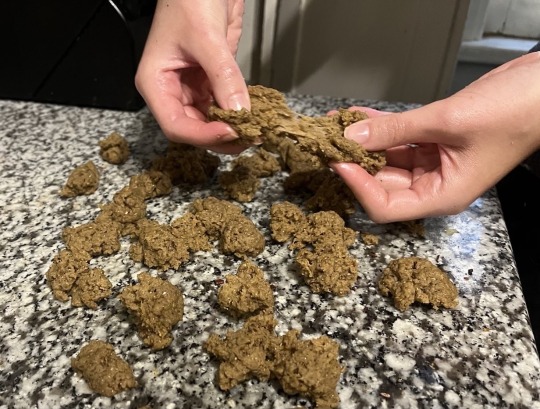
Stringy seitan being pulled apart into pieces.
You may also shape the dough into a slab and cube it with a sharp knife—the lamb or beef used in summagiyya is usually cubed—but I prefer the texture of torn seitan to sliced.
5. Steam the seitan pieces for 10 minutes in a bamboo steamer or using a metal steamer basket. Place the bamboo steamer in the bottom of a wok and cover its base by about 1/2" (1 cm), then raise the heat to boil the water; lower the heat to keep the water at a simmer. If using a steamer basket, place it over the opening of a pot containing a couple inches of water and bring it to a simmer. Start the timer when the water begins simmering.
6. Heat olive oil on medium-high and sear the steamed seitan pieces, turning as necessary, until deeply browned on all sides. Set aside.
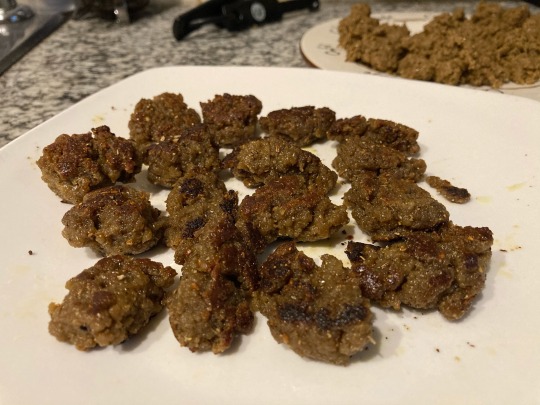
Fried seitan pieces.
You can save a step here by searing the raw seitan, then returning it to the pot after you've fried the onions to simmer it rather than steaming. I found that this produced a mushier texture.
For the dagga (دقة):
1. Grind cumin and black pepper thoroughly in a mortar and pestle, then add dried red pepper and dill seed and crush coarsely. Add green sweet pepper and garlic and pound until a coarse mixture forms.
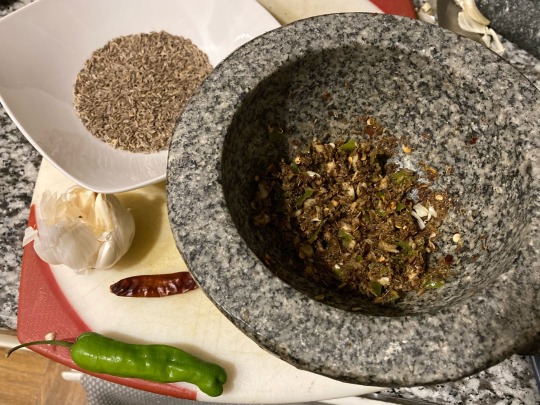
Dill seeds, green sweet pepper, garlic, and dried red chili on a cutting board, alongside dagga in a large granite mortar.
You may also use a spice mill or food processor.
To assemble:
1. Chop the onion. Wash the chard and slice it thinly in one direction; turn it ninety degrees and slice thinly again.
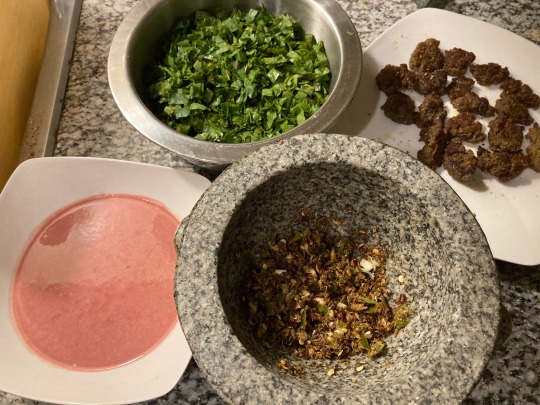
Diced chard, fried seitan, dagga, and sumac-infused water with flour.
2. In a large pot, heat a couple tablespoons of olive oil on medium. Fry chopped onion, cardamom pods, and allspice berries for a minute until fragrant. Add half of the dagga and fry until fragrant.
3. Add chard and fry, mixing often, until wilted.
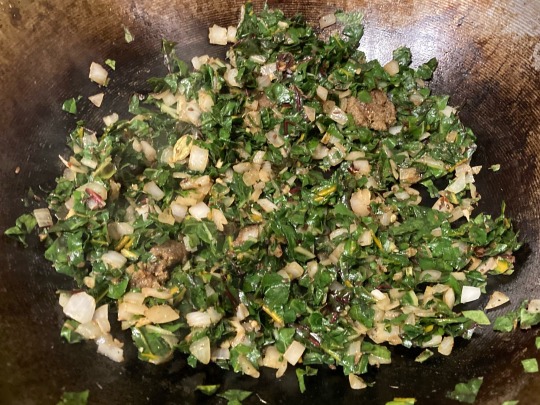
Wilted chard in a wok.
4. Add sumac mixture, chickpeas, and water to cover. Bring to a boil, then lower heat to a simmer. If you didn't steam your seitan earlier, add it now.
5. Continue to stir and simmer until the stew is thick, homogenous, and greyish-brown, about 15 minutes.
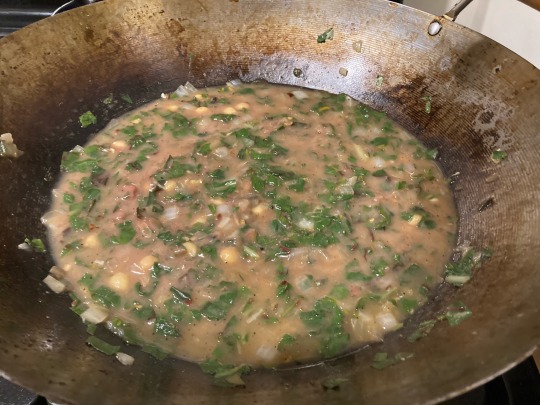
Simmered stew.
6. Add the remainder of the garlic mixture, the red tahina, a pinch of ground cumin, the 1/4 cup olive oil, and salt to taste. Return the steamed and seared seitan to the pot and mix.
Serve cool with flatbread, sweet green peppers, bitter green and black olives, carrots, leafy greens, and/or pickles.
#vegetarian recipes#vegan recipe#vegan cooking#Palestinian#Gazan#chickpeas#lamb#seitan#chard#dill seeds#pomegranate molasses
500 notes
·
View notes
Text

Vegan Coffee Cake
#cake#cakes#sweet#dessert#desserts#coffee#coffee cake#vegan#veganism#vegan food#vegan recipe#home cooking#recipe#vegetarian#vegan recipes#veganrecipes#go vegan#what vegans eat#veganfood#vegan foodporn#animalrights#crueltyfree#cruelty free#animal rights#animal liberation#animal welfare
182 notes
·
View notes
Text
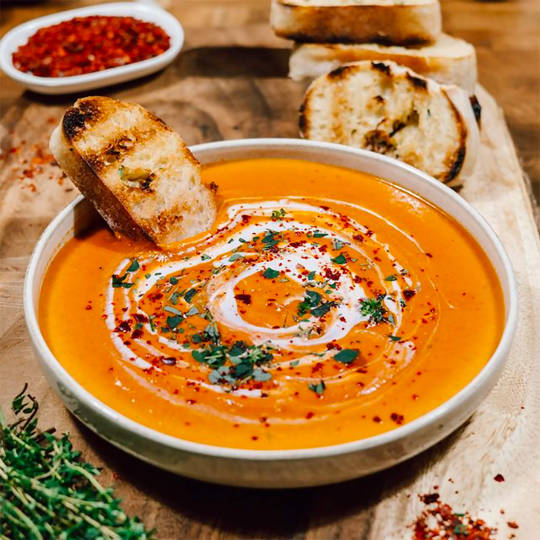
Tomato soup lovers rejoice! 🍅 This version roasts and sautés all the ingredients to lock in deep flavors with hints of ginger and maple syrup, finished with super creamy soy skyr, a thick filtered yogurt 🍂🍁
#tomato#tomato soup#veganrecipes#plantbased#vegan#veganrecipe#plantbasedrecipes#plantbasedrecipe#veganism#plantbased recipes#vegetarian#go vegan#vegan soup#vegan recipes#vegan recipe#vegan cooking#vegan food#veganfood#gluten free#veggies#spices#baked vegetables#sautéed#creamy soup#fall food#autumn#fall vibes#fall recipes
247 notes
·
View notes
Text
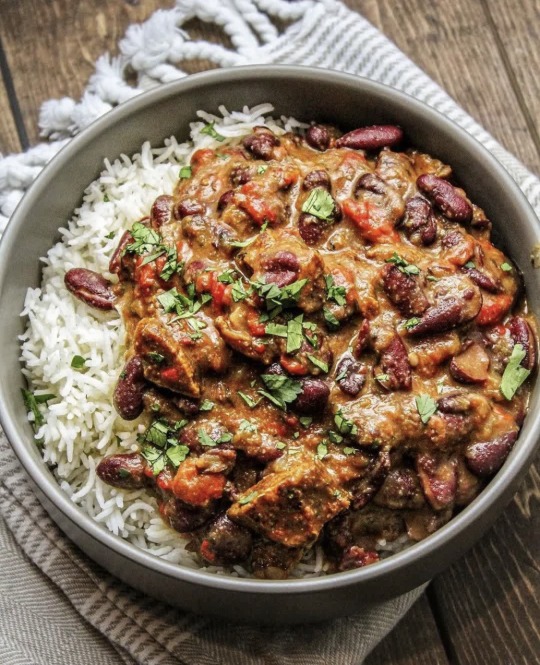
Red beans and rice (vegan)
#red beans and rice#red beans and rice recipe#vegan red beans and rice#vegan red beans and rice recipe#red beans#rice#vegan#vegan recipe#vegetarian#vegetarian recipe#plant based#plant based recipes#dinner#dinner recipes#food#food blog#recipe#dinner ideas
214 notes
·
View notes
Photo

vegan lasagna
243 notes
·
View notes
Text
Image by Garnished with Gratitude.

29 notes
·
View notes
Text

Source: kristineberniceong on Instagram
For more vegan inspiration, join Vegan Bento Boxes on Facebook!
#fiona and cake#adventure time#adventuretime#cartoon network#cartoons#vegan#vegetarian#cartoonnetwork#veganfood#vegan food#vegan recipes#vegan foodporn#vegan recipe#veganism#go vegan#rice#food#food photography#recipe#recipes#food art#art#artist
33 notes
·
View notes
Text
vegan chocolate coffee magnums



#vegan#vegan recipes#vegan recipe#vegan chocolate coffee magnums#vegan chocolate coffee magnum recipe
10 notes
·
View notes
Text
Pak Choi Noodles (Vegan)
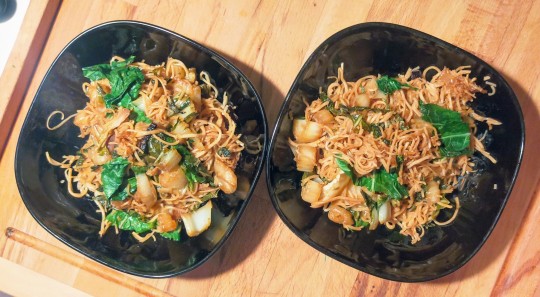
These simple Pak Choi Noddles make an easy, yet flavourful and hearty dinner. Happy Thursday!
Ingredients (serves 2):
200 grams/7 ounces egg noodles
4 cups boiling water
1 ½ tablespoon toasted sesame oil
1 thumb-sized piece fresh ginger
a large garlic clove, minced
half a red chili pepper
a large, beautiful pak choi (or 2 smaller ones)
1 tablespoon rice vinegar
2 tablespoons soy sauce
2 tablespoons sweet soy sauce
Place egg noodles in a medium bowl. Cover with boiling water, and place a lid on top. Allow noddles to cook, about 5 minutes.
Meanwhile, in a large wok, heat toasted sesame oil over medium-high heat.
Peel ginger, and cut it into very thin slices. Add to the wok, and fry, a couple of minutes. Add garlic, and cook, 1 minute more.
Thinly slice red chili pepper, and stir into the wok. Cook, a couple of minutes.
Thoroughly rinse pak choi under cold water.
Cut off and discard the bottom of the pak choi, and cut off the leaves, reserving for later. Chop white part of the pak choi, and stir into the wok. Cook, coating in oil and spices, about 5 minutes.
Deglaze with rice vinegar, soy sauce and sweet soy sauce.
Drain cooked egg noodles, and rinse under cold water. Set aside.
Stir half of the reserved pak choi leaves into the wok, and cook until just wilted. Then, stir in drained egg noodles, and remaining pak choi leaves, coating well in the sauce.
Serve Pak Choi Noodles hot.
#Recipe#Food#Pak Choi Noodles#Pak Choi Noodle recipe#Noodles#Noddle recipe#Pasta and Noodle#Egg Noodle#Pak Choi#Fresh Pak Choi#Sesame Oil#Toasted Sesame Oil#Ginger#Garlic#Red Chilli#Red Chilli Pepper#Chilli Pepper#Rice Vinegar#Soy Sauce#Sweet Soy Sauce#Quick recipe#Easy recipe#Thrifty#Thrifty recipe#Vegan Noodles#Vegan recipe#Vegetarian and Vegan#Thai Lao Japanese Chinese Chufang#Asian Cuisine
17 notes
·
View notes
Photo
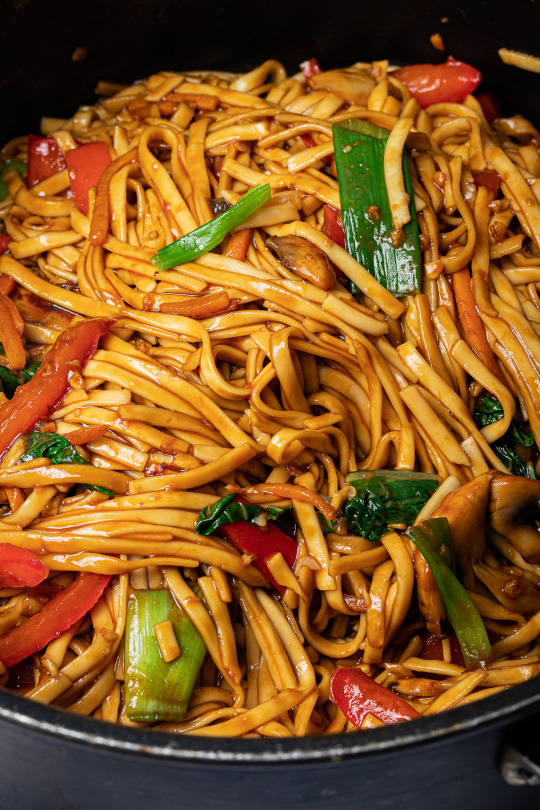
15 Minute Vegan Lo Mein
#vegan#food#recipe#vegan food#vegan recipe#vegan recipes#lunch#supper#yum#yummy#delicious#food porn#recipes#veganism#dairy free#egg free#submission
343 notes
·
View notes
Text

Vegan Gnocchi Soup
#vegan#food#vegetarian#vegan food#veganism#recipe#plantbased#vegan recipe#vegan recipes#dinner#vegan soup#vegan dinner#soup#soup posting#soup recipe
65 notes
·
View notes
Text
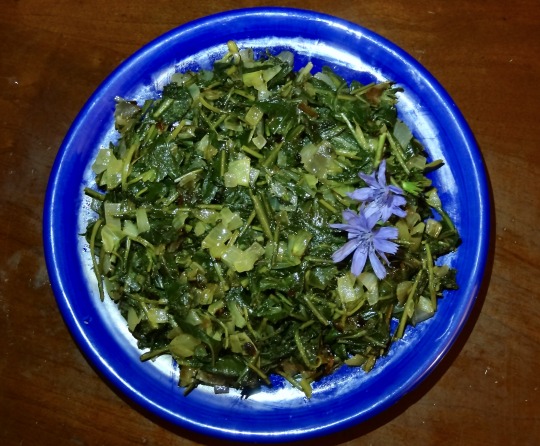
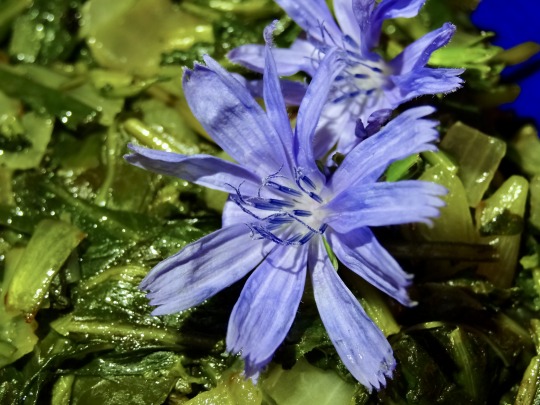
[ID: A plate of leafy greens topped with two blue chicory flowers; second photo is a close-up on a flower. End ID]
هندبة بالزيت / Hinda b al-zayt (Palestinian wild greens with olive oil)
“هندبة” (“hindba”), “هِنْدِبَاء” (“hindibāʔ”), or هِنْدَب (“hindab”) is an Arabic word referring to chicory, wild endive, or dandelion greens.
Two Palestinian dishes are commonly made using hindba. One isهندبة بزيت (hinda b zayt), hindba with [olive] oil, which combines blanched greens with browned onion, lemon juice, and (of course) olive oil. Lebanese hindba is similar, consisting of greens prepared in the same way, but topped with sliced, caramelised onions. The other preparation of hindba is with a dressing made with tahina (tahini), lemon juice, chili, and sometimes garlic or yoghurt.
This recipe is for hindba with onion and olive oil. The dish is simple to make but has a lot going on, flavor-wise. Slow frying renders the onions tender, sweet, and jammy, balancing out the slight bitterness of the greens. The rich, peppery, fruity taste of good olive oil rounds out the earthiness of chicory, while lemon juice provides brightness and lift.
Several food aid organizations have been forced to discontinue operations in Gaza. Some of those still on the ground are:
Palestinian Red Crescent Society
World Central Kitchen
Anera
Ingredients:
2 bunches (130g) chicory or dandelion leaves
1 large yellow onion, chopped
Juice of 1 lemon
Olive oil
Salt, to taste
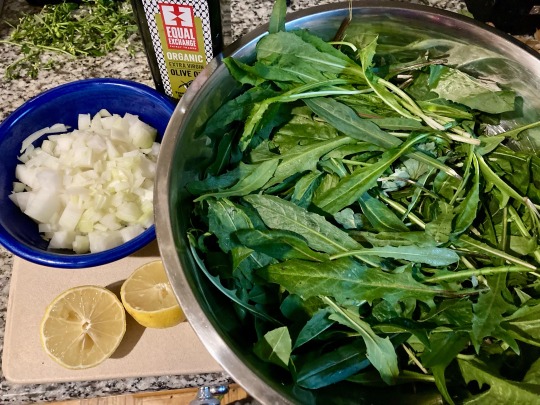
Instructions:
1. Boil chicory in salted water for 5-7 minutes, until tender, then drain. If using dandelion greens, boil for 10 minutes. (The boiling water is potable, but probably too bitter to be palatable.)
2. Heat olive oil in a large skillet on medium-low. Add onion and a pinch of salt and fry until softened and golden brown, 10-15 minutes.
3. Squeeze the water out of the greens and chop into about 1/2" (1cm) pieces. Add to the pan and fry until wilted.
4. Taste and adjust salt. Add lemon juice to taste.
Serve hot or cold, topped with good olive oil. Eat hindba by scooping it up with khubbiz al-kmaj (pita).
Identifying chicory:
Common chicory (Cichorium intybus) is also in the Astaraceae family. Stems are grooved and slightly hairy; woody and branched; multiple flowers usually grow along one stalk. Leaves are smooth or irregularly toothed, pointed at the tip, and may have different appearances at different parts of the plant. The leaf midribs are green or reddish. The leaves you want are the larger ones growing in a bunch towards the base of the stem.
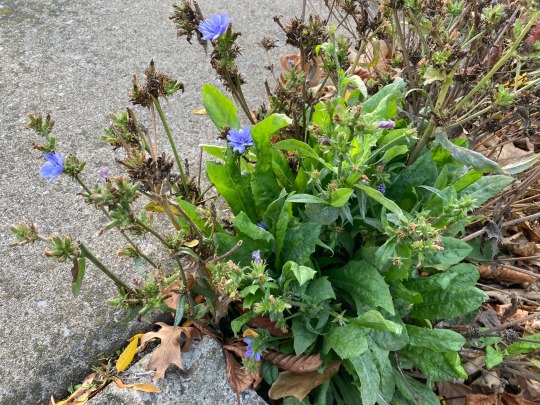
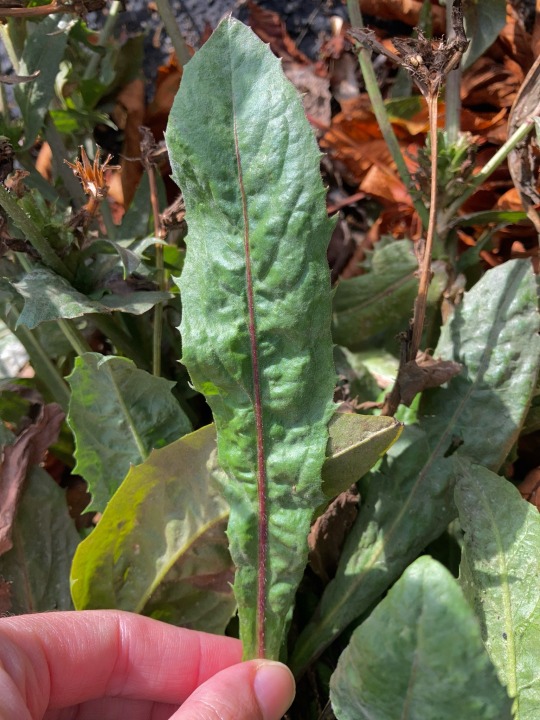
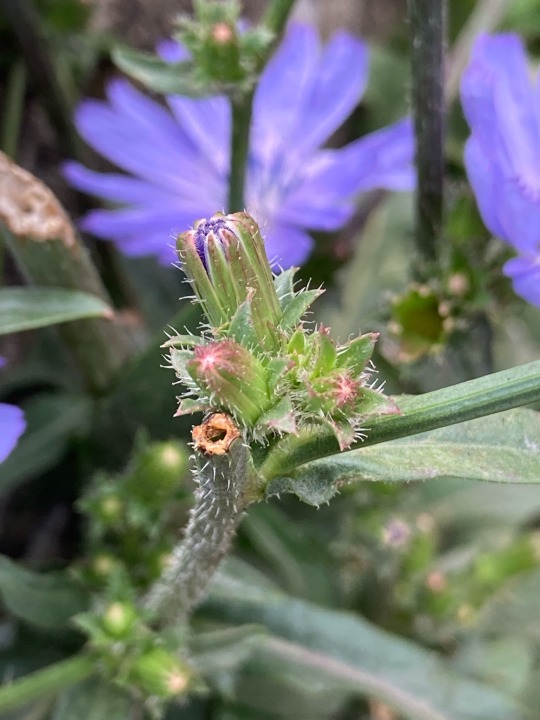
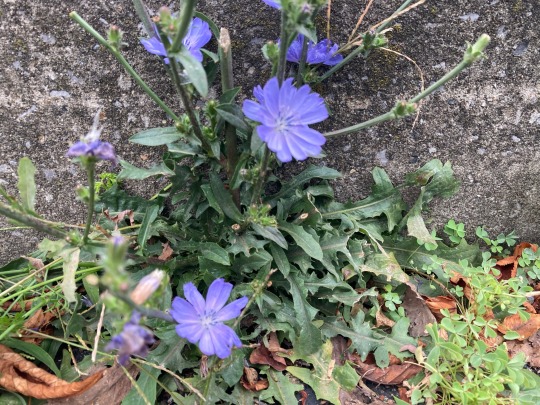
This plant has some leaves with larger teeth.
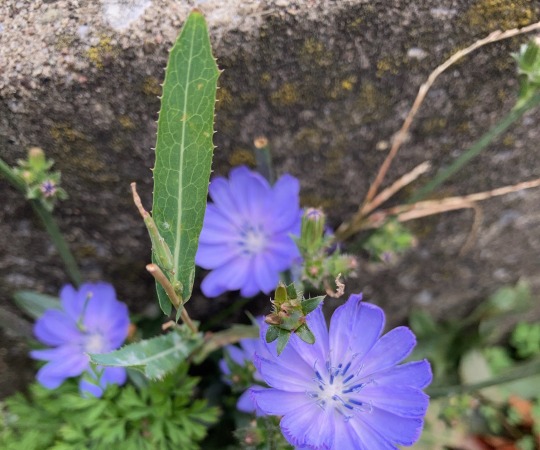
Smaller, lanceolate leaves grow in alternate sides along the stem.
Flowers are light blue to lavender and finely toothed; there are two rows of darker bracts in the center of each flower.
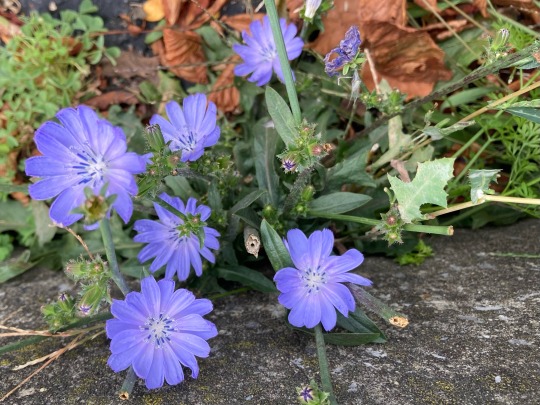
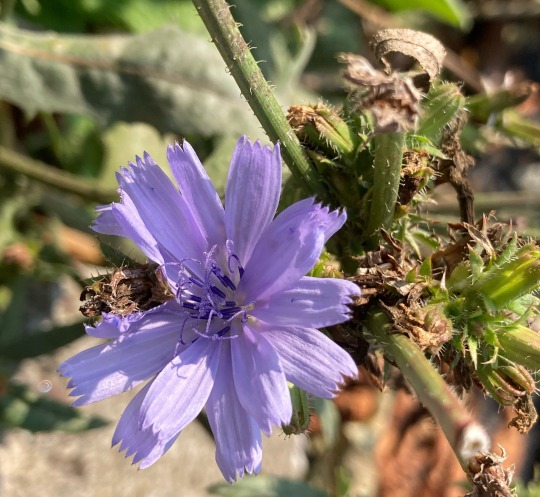
In the fall, the leaves often remain while the flowers and stalks have died, leaving a brown, branching, skeletal structure behind.
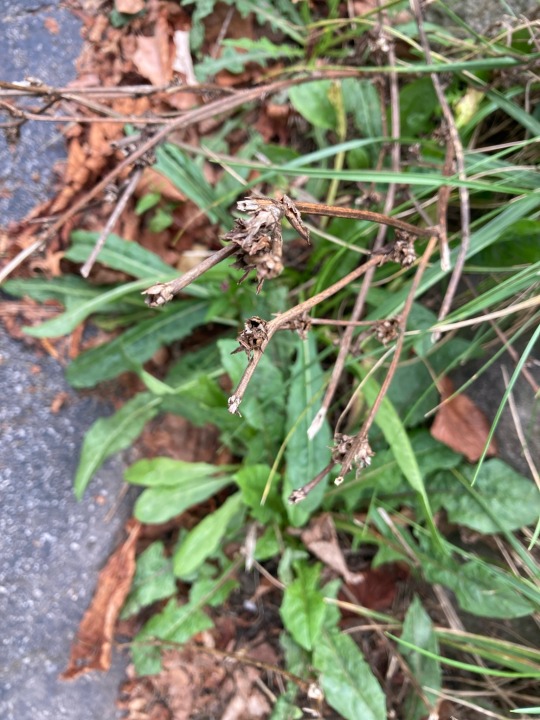
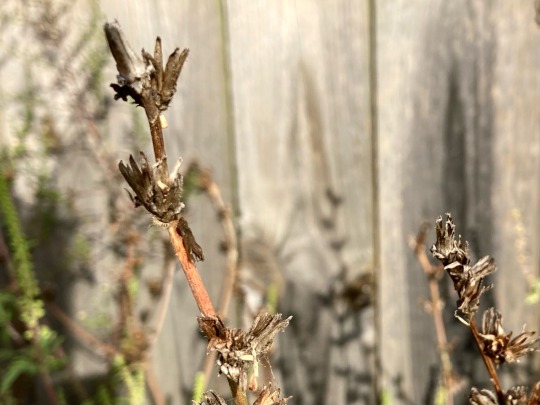
Identifying dandelion:
See hinda b al-tahina.
75 notes
·
View notes
Text

Easy Homemade Baked Potato Crisps
#crisps#potato#potatoes#snacks#savoury#recipe#recipes#vegan#food#vegetarian#veganism#plantbased#plant based#govegan#go vegan#foodpics#food porn#foodporn#food photography#cooking#baking#foodie#comfort food#photography#foodgasm#vegan food#vegan recipe#what vegans eat#vegan recipes#veganfood
95 notes
·
View notes
Text
Rigatoni tossed in a creamy lemon garlic sauce with fresh basil, topped off with lemon zest. It's simple, fresh and flavorful.

#veganrecipes#plantbased#vegan#veganrecipe#plantbasedrecipes#plantbasedrecipe#veganism#plantbased recipes#vegetarian#go vegan#lemon#creamy pasta#pasta#pasta dish#pasta sauce#vegan pasta#vegan recipes#vegan recipe#plant based recipes#plant based#plantbased recipe#creamy#meal#lunch recipe#lunch#lunchtime#dinner#dinner recipes#lunch recipes
152 notes
·
View notes